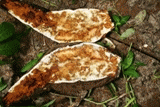A team of international and Malawian researchers and agriculturalists gathered in Lilongwe, Malawi, om March 4 2011, have called upon the government of Malawi and other development partners to put in place measures to control the deadly Cassava brown streak disease (CBSD) in the country before it reaches a crisis level.
This
disease, causing a dry rot in the crop's roots and making them economically
useless-they are inedible and also cannot be milled into flour,
Kondowole, has drastically affected cassava production and food security
in neighbouring countries where it is rapidly spreading to new areas.
Although CBSD has been in Malawi for more than five decades, in the areas around Lake Malawi, little has done to control it due to a low awareness of the disease. Urgent action must now be taken to protect the crop, which is the second most important staple in the country and plays a key role in assuring food security.
The team identified priority actions to stop the spread of the disease and reduce its impact. The breeding of cassava varieties that are tolerant or resistant to the disease must be intensified to give farmers more options. Furthermore, breeding is a time consuming exercise that calls for a long-term commitment to its implementation.
The level of awareness on the disease, how it spreads, its symptoms and the measures to be taken to halt its spread needs to be greatly strengthened particularly among the Ministry of Agriculture staff, extension workers and farmers. This calls for an intensive awareness campaign using all mediums such as local meetings, radio, mobile vans, leaflets, and posters to reach these target groups.
The disease is spread by sharing of infected planting materials and by a vector, the whitefly. New research work by the International Institute of Tropical Agriculture (IITA) in East Africa has shown that CBSD does not spread well over long distances. Disease-free fields can therefore be protected from infection by isolating them from infected cassava fields.
Another key component of a comprehensive CBSD management strategy is establishing effective systems for producing, maintaining and distributing disease-free planting material.
Major new outbreaks of the rot disease have been reported in recent years from the Great Lakes region of East Africa. Worryingly, this is the first time that CBSD has been shown to spread at mid- to high-altitudes (above 1,000 metres above sea level).
If a similar switch happens in Malawi, cassava in the entire country will be threatened. This therefore highlights the importance of doing frequent intensive pest and disease surveys to monitor its spread so as to start mitigation quickly in the case of any new outbreaks.
The next vital next step for the group will be to secure funding support for the priority activities identified.
The meeting was organized by scientists from the IITA, and the University of Malawi's Chancellor College who are implementing a USAID funded project on "Addressing Cassava Brown Streak Disease in Malawi.' It brought together a diverse group of participants, sharing a common interest in the development of cassava in Malawi. These included representatives from: the Departments of Agricultural Research Services and Crop Protection and Horticulture of the Ministry of Agriculture and Food Security, Agricultural Development Divisions and Extension Services in Districts affected by CBSD, Bunda College, farmers, IITA and Chancellor College.
###
About IITA ( http://www.iita.org )
Africa has complex problems that plague agriculture and
people's lives. We develop agricultural solutions with our partners to tackle
hunger and poverty. Our award - winning
research for development (R4D) is based on focused, authoritative thinking
anchored on the development needs of sub-Saharan Africa. We work with partners in Africa and beyond to reduce producer and consumer risks,
enhance crop quality and productivity, and generate wealth from agriculture.
IITA is an international nonprofit R4D organization established in 1967, governed by a Board of
Trustees, and supported primarily by the CGIAR.





